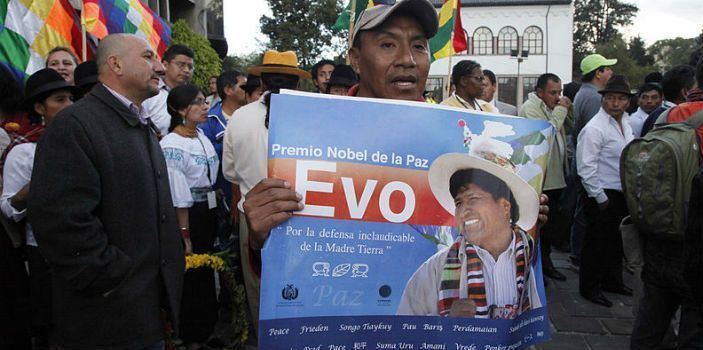
EspañolThose who thought recent presidential elections in Latin America would shift the continent’s political-ideological map were wrong.
There was doubt over the future of Latin-American progressives, given the promise of the Aécio Neves’s campaign in Brazil, a potential Luis Lacalle Pou victory over Tabaré Vásquez in Uruguay, and the waning popularity of Presidents Michelle Bachelet of Chile and Cristina Kirchner of Argentina.
Did that come to be? Had progressives lost their primary base of electoral support? Preliminary polls predicted “technical” ties, giving hope to opposition segments; but had there actually been a shift towards liberalism in Latin America?
Had there actually been a shift towards liberalism in Latin America?
No, of course not. Brazilians reelected Dilma Rousseff, and barring something completely unexpected — always a possibility in Latin-American politics — Tabaré Vásquez will win the presidency in Uruguay.
Victorious in all contests, this electoral year brought no bad news for Latin-American progressives. A few days ago, Evo Morales, a seemingly permanent fixture, won yet another term as president of Bolivia. Before that, Rafael Correa won in Ecuador, Salvador Sánchez in El Salvador, Juan Carlos Varela in Panama, and Luis Guillermo Solís in Costa Rica.
In Venezuela, Nicolás Maduro took an important step for his country by gaining a seat as a non-permanent member of the UN Security Council. Meanwhile in Cuba, 25 years after the fall of the Berlin Wall, the Castro brothers remain in power.
The Pacific Alliance — comprised of Chile, Peru, Colombia, and Mexico — has been much more successful than Mercosur, but their executives are hardly free-market oriented, with the possible exception of Juan Manuel Santos.
So, what happened?
Opinions continue to be sympathetic towards various forms of progressivism.
While recent polls registered some degree of discontent among the Latin-American public, opinions continue to be sympathetic towards various forms of progressivism. Voters seem content to forgive the defects and errors of the interventionists and socialists for now. The Rousseff campaign in Brazil, for example, was given a scare, but perhaps the public were simply sending the president a message: “We’ll see if she learns her lesson.”
On the other hand, Latin America’s classical liberals and believers in the free market have not done much to move public opinion in their favor. Some countries in the region are engaged in internal bickering and power struggles, while others are mired in debates about who is the most doctrinally pure.
In almost all countries there is an absence of leadership, leaving the majority of the continent with no real alternative. People complain of the supremacy of the statist left, of the manner in which they control the debate, of the language and the culture, but they do nothing to push back and lead the debate.
Perhaps, as was recognized by then-Chilean presidential candidate Ricardo Lagos when he advanced to a runoff election in 1999, it is time for progressives to listen to “the message of the people.” In other words, the lack of a vibrant and organized opposition right now is not a mandate to run riot.
They should take the opportunity to abandon ideological, exclusive, intolerant, and arrogant discourse — and just as some progressives did in the 1990s, return to a path of growth and necessary economic reforms, based on confidence in private enterprise, markets, investors, and consumers. Such a turn would contribute to the credibility of each economy, foster transparency, and keep government spending under control.
At some point the middle class are simply no longer willing to hand over blank checks to the rulers of the day.
The history of our continent moves like a pendulum. Votes of punishment, like those suffered by Chile’s Concertación coalition in 2010, can repeat themselves time and again, without necessitating a societal move towards liberalism.
At some point the middle class are simply no longer willing to hand over blank checks to the rulers of the day. They become aware of their power, and from there, there is no turning back.
Translated by Alex Clark-Youngblood. Edited by Guillermo Jimenez and Fergus Hodgson.
 Versión Español
Versión Español












